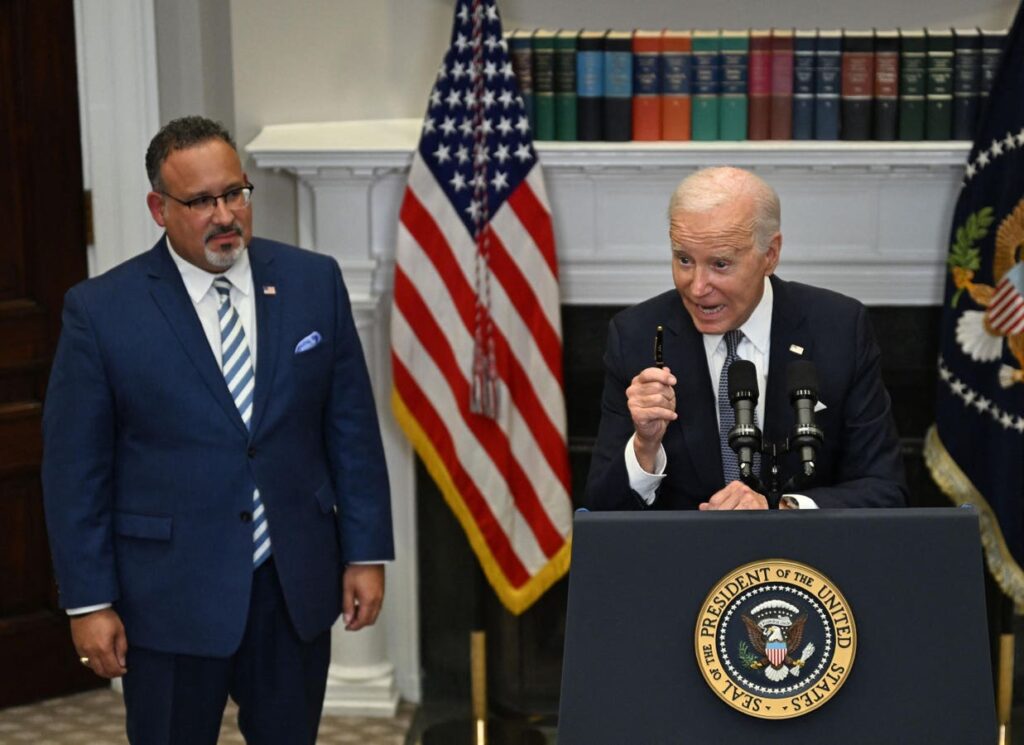A federal court has agreed with a Biden administration request to extend the implementation deadline for student loan forgiveness and other relief under under a landmark settlement agreement.
The settlement, which was supposed to have resolved a long-running class action lawsuit over stalled requests for student debt relief under a program for defrauded borrowers, should have resulted in $6 billion in discharges for more than 200,000 borrowers. Under the terms of the agreement, the Education Department was to have completed implementation by the end of January.
But nearly a third of borrowers covered by the settlement have still not received the debt relief they are entitled to. As a result, the parties found themselves back in court last week. Following a judge’s ruling last week, the department now has several more months to implement the student loan forgiveness required under the agreement.
Here’s the latest.
Education Department Did Not Implement Student Loan Forgiveness And Other Settlement Relief By Key Deadline
The settlement agreement was supposed to be a final resolution for the Sweet v. Cardona litigation, a long-running class action lawsuit initially brought against the Trump administration over thousands of stalled or arbitrarily denied applications for loan forgiveness under the Borrower Defense to Repayment program. Borrower Defense can wipe out the federal student loan debt for those who were victimized by their school through fraud, false promises, or misrepresentations about key aspects of a program such as admissions, education services, or career prospects.
In November 2022, after years of legal battles that continued into the Biden administration, the class of student loan borrowers and the Education Department reached a settlement agreement, which a federal court approved. Under the terms of that agreement, more than 200,000 individuals who previously had filed Borrower Defense claims and had enrolled in one of several dozen specific schools would receive a complete discharge of their applicable federal student loan debt, along with refunds of past payments and some credit repair.
The Education Department was supposed to complete implementation of the Sweet settlement relief by January 28, 2024. But the department and attorneys for class members agreed that tens of thousands of borrowers have not received loan forgiveness or any other settlement-related benefits by that court-approved deadline.
Borrowers Took Education Department Back To Court To Compel Student Loan Forgiveness Implementation
Last month, the Project on Predatory Student Lending — the legal organization representing borrowers in the Sweet v. Cardona case — filed a motion to enforce the previously-approved settlement agreement. The Project accused the department of breaching its obligations under that agreement, harming borrowers in the process.
“Class Members are suffering serious, ongoing harm” due to the department’s failures, wrote the Project in its motion. Attorneys noted that borrowers were expecting to receive the settlement relief by January so that they could “pay for life necessities” such as healthcare or buying a car. Other borrowers have been subjected to “unlawful” collections practices by the department’s contracted student loan servicers for debts that, at this juncture, should no longer exist, leading to confusion and stress.
The attorneys noted that, “When student loan borrowers miss deadlines, the consequences are immediate and drastic,” including a loss of access to federal student loan forgiveness programs. When borrowers default on their federal student debt, they can be subject to credit damage and involuntary collections activities such as administrative wage garnishment and offset of Social Security benefits. “The Department of Education, which permits such draconian measures for its constituents, should not be permitted to escape accountability for its own missed deadlines,” reads the motion.
Court Extends Student Loan Forgiveness Deadline
At a hearing last week, attorneys for the Education Department acknowledged that many borrowers have not received the relief they are entitled to under the Sweet v. Cardona settlement, including many who are still waiting for student loan forgiveness. The department indicated that the delays are due to a variety of administrative issues including the need to track down and unwind complicated consolidation histories, multiple loans servicing transfers, and complex transaction histories associated with many separate student loans.
In response, the federal judge overseeing the settlement declined to impose penalties on the department at this juncture. Instead, he extended the deadline for officials to complete implementation of the settlement agreement.
The judge “reluctantly accepted the Department’s request to extend the deadline for delivering full relief to August 31, 2024,” said the Project on Predatory Student Lending. However, the court also imposed additional obligations on the department to “ensure accountability.” These include:
- Progress report hearings with the court in May, June and July to check on the status of implementation of settlement relief.
- Biweekly, out-of-court, in-person meetings by all parties.
- Appointing the FSA Ombudsman — a dispute resolution division within the department — as the designated point of contact for Sweet v. Cardona class members.
Borrowers with questions on the updates to the settlement timeline can contact the Project on Predatory Student Lending. In addition, the department has established a designated email for inquiries to the FSA Ombudsman related to the Sweet v. Cardona settlement: sweet@ed.gov.
Read the full article here
















